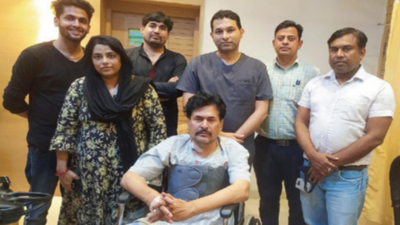Top Searches
- News
- City News
- nagpur News
- Man survives tear in aortic wall, travels 400km for surgery in Nagpur
Man survives tear in aortic wall, travels 400km for surgery in Nagpur

The patient underwent a 7-hour-long complex operation at Crescent Hospital
NAGPUR: A 50-year-old resident of Shahdol, around 450kms from here, had a miraculous escape after he suffered Type A aortic dissection (separation of layers of aorta — the biggest artery in human body, starting from just above the heart and stretching up to the legs) last week.
Initially, the case was wrongly diagnosed as heart attack in a local hospital but when the man’s pain kept increasing he was referred to Bilaspur where he was found to have a major damage in his aorta.
The life-threatening condition could have compromised the blood supply to all vital organs of the body.
The family immediately contacted Nagpur’s interventional cardiologist Dr Kashif Syed who started preparing for the surgery at midnight as the patient was on the way from Bilaspur. The patient arrived at 3am covering 400km by road and was straight away sent for a 7-hour-long complex operation at Crescent Hospital.
“As soon as, I saw his reports on phone I realised he would require an immediate surgery as the damage was extensive. CT scan is required for diagnosis. It was kept ready along with the surgeon, anaesthetist and OT. Everything was lined up and by 4am the surgery started,” said Dr Syed.
Following aortic dissection, the mortality risk start increasing by 1% after a delay of every hour. The patient had lived the incident for 15 hours before reaching the OT and thus doctors couldn’t afford further delay. “I haven't seen such a patient survive after an event of aortic wall tear in my career spanning over a decade,” said Dr Syed.
“Dr Nikunj Pawar performed the challenging and technically demanding surgery of repairing and grafting of the aorta. The surgeon had just 15-20 minutes to complete the repair of aorta during total circulatory arrest (TCA),” Dr Syed said.
During TCA, the patient’s blood was drained out, pooled and kept in an artificial machine. The procedure is called cardiopulmonary bypass.
“In TCA, the patient’s body is cooled at 17 degree Celsius. This was done by perfusionist Prachi Sonewane. The anaesthetist also has an extremely important job of protecting the brain during this circulatory arrest, which was done by Dr Shrikant Bobade. Management of aortic dissection is among the most challenging situation in cardiovascular diseases,” said Dr Syed.
If not managed properly, 95% of the aortic dissection patients die in two to three days. “A team work in early diagnosis, challenging surgery and anaesthesia ensured that the patient had a miraculous escape,” said Dr Syed.
Initially, the case was wrongly diagnosed as heart attack in a local hospital but when the man’s pain kept increasing he was referred to Bilaspur where he was found to have a major damage in his aorta.
The life-threatening condition could have compromised the blood supply to all vital organs of the body.
The family immediately contacted Nagpur’s interventional cardiologist Dr Kashif Syed who started preparing for the surgery at midnight as the patient was on the way from Bilaspur. The patient arrived at 3am covering 400km by road and was straight away sent for a 7-hour-long complex operation at Crescent Hospital.
“As soon as, I saw his reports on phone I realised he would require an immediate surgery as the damage was extensive. CT scan is required for diagnosis. It was kept ready along with the surgeon, anaesthetist and OT. Everything was lined up and by 4am the surgery started,” said Dr Syed.
Following aortic dissection, the mortality risk start increasing by 1% after a delay of every hour. The patient had lived the incident for 15 hours before reaching the OT and thus doctors couldn’t afford further delay. “I haven't seen such a patient survive after an event of aortic wall tear in my career spanning over a decade,” said Dr Syed.
“Dr Nikunj Pawar performed the challenging and technically demanding surgery of repairing and grafting of the aorta. The surgeon had just 15-20 minutes to complete the repair of aorta during total circulatory arrest (TCA),” Dr Syed said.
During TCA, the patient’s blood was drained out, pooled and kept in an artificial machine. The procedure is called cardiopulmonary bypass.
“In TCA, the patient’s body is cooled at 17 degree Celsius. This was done by perfusionist Prachi Sonewane. The anaesthetist also has an extremely important job of protecting the brain during this circulatory arrest, which was done by Dr Shrikant Bobade. Management of aortic dissection is among the most challenging situation in cardiovascular diseases,” said Dr Syed.
If not managed properly, 95% of the aortic dissection patients die in two to three days. “A team work in early diagnosis, challenging surgery and anaesthesia ensured that the patient had a miraculous escape,” said Dr Syed.
FOLLOW US ON SOCIAL MEDIA
FacebookTwitterInstagramKOO APPYOUTUBE
Start a Conversation









